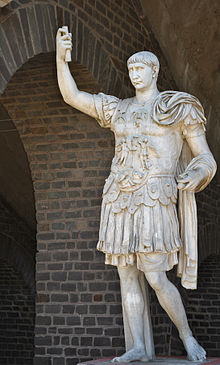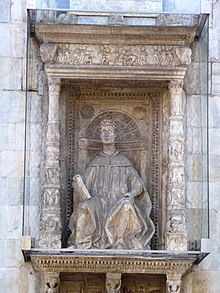Self-enhancing
When the apostles had died there came a time when those in charge of teaching and going around telling about the gospel, started coming to see themselves as special people. Some even started to consider themselves as ‘clergy of the highest order’.
After a time the organisation of the church was given only to the highest order, the bishops having the chief government of the Church. It has since been found convenient that some bishops should be placed above others, and should be called by higher titles, such as archbishops and patriarchs, but these all belonged to the same order of bishops; just as in a parish, although the rector and the curate had different titles, and one of them was above the other, they were both most commonly presbyters (or, as many now say, priests).

One of the most famous among the early bishops was the one who later by many became called “St. Ignatius“, bishop of Antioch, Ignatius Theophoros (Greek: “God Bearer”), known mainly from seven highly regarded letters that he wrote during a trip to Rome, as a prisoner condemned to be executed for his beliefs. He is responsible for bringing the transition from “The Way” its Jewish origins to its assimilation in the Greco-Roman world. He laid the foundation for dogmas that would be formulated in succeeding generations, bringing Christendom further away from the original teachings. His advocacy of a hierarchical structure of the church with an emphasis on episcopal authority. Though he was still a teacher of Jesus being a real human being, a man of flesh and blood. His insistence on the real humanity of Christ though started getting other teachers wanting to see Jesus to be a god or even being God having come to earth. That last part comes from the religious and philosophical movement popular in the Roman world in the 2nd–3rd century. Several false teachers were under the influence of the Gnostic influences and were taking elements of the three-headed gods from the Roman Greco culture.
A soldier-emperor dealing with Christians
Ignatius had known the apostle John, and was made bishop of Antioch about thirty years before the apostle’s death. He had governed his church for forty years or more, when the Roman soldier-emperor Trajan came to Antioch. After Augustus, Trajan is remembered as a successful soldier-emperor who presided over the second-greatest military expansion in Roman, history.


Trajan corresponded with Pliny the Younger on the subject of how to deal with the Christians of Pontus, telling Pliny to continue to persecute Christians but not to accept anonymous denunciations in the interests of justice as well as of “the spirit of the age”. Non-citizens who admitted to being Christians and refused to recant, however, were to be executed “for obstinacy”. Citizens were sent to Rome for trial.
Secret meetings
Trajan seems never to have thought that the Gospel could possibly be true, and thus he did not take the trouble to inquire what the Christians really believed or did. They were obliged in those days to hold their worship in secret, and mostly by night, or very early in the morning, because it would not have been safe to meet openly; and hence, the heathens, who did not know what was done at their meetings, were tempted to fancy all manner of shocking things, such as that the Christians practised magic; that they worshipped the head of an ass; that they offered children in sacrifice; and that they ate human flesh! It is not likely that the Emperor Trajan believed such foolish tales as these; and, when he did make some inquiry about the ways of the Christians, he heard nothing but what was good of them. But still he might think that there was some mischief behind; and he might fear lest the secret meetings of the Christians should have something to do with plots against his government.
Neither Pliny nor Trajan mentions the crime that Christians had committed, except for being a Christian; and other historical sources do not provide a simple answer to what that crime could be, but most likely due to the stubborn refusal of Christians to worship Roman gods; making them appear as objecting to Roman rule.
Trajan’s response to Pliny makes it clear that being known as a “Christian” was sufficient for judicial action. {Wikipedia – The Power of Sacrifice: Roman and Christian Discourses in Conflict by George Heyman (Nov 2007) ISBN 0813214890 pp xii–ix + Backgrounds of Early Christianity by Everett Ferguson (Aug 19, 2003) ISBN 0802822215 pages 504-596}
+
Next: Religion and believers #13
Preceding
Religion and believers #1 Lots of groups to be taken interest in
Religion and believers #2 Different forms of Truth
Religion and believers #3 From father and mother gods to land and local gods
Religion and believers #4 Order of Nature and Polytheism on the way to monotheism
Religion and believers #5 Transition to Monotheism
Religion and believers #6 Origin of a church
Religion and believers #7 Independent and organised form of existence of a religion
Religion and believers #8 Groups following one or another apostle
Religion and believers #9 Old and new cults
Religion and believers #10 Infiltrating pagan teachings
Religion and believers #11 Prospect of a life without end in a peaceful kingdom
++
Additional reading
- Did Jesus Exist? Searching for Evidence Beyond the Bible (Bible Students on From Guestwriters)
- A rebellious movement founded on a fake? (Ou World)
- A rebellious movement founded on a fake? (Some View on theWorld)
- Structuur -structure
- A visible organisation on earth
- Can we not do what Jesus did?
+++
Related
- Did Jesus Exist? Searching for Evidence Beyond the Bible
- The Tuesday Type: Trajan
- Dead Kings Club: Trajan
- Bring Me The Head of Emperor Trajan!
- Paid Applause In The Roman Centumviral Court
- Pliny the Younger
- The Bookish Lifestyle Of Pliny The Elder
- The Self-Incriminating Documentation Of Governor Caecilius Classicus
- Pliny The Elder’s Criticism Against Pronunciation Critics
- The Slaughterous Funeral Of Marcus Aquilius Regulus’ Son
- Pliny The Younger’s Odd Purchase Of A Corinthian Bronze Statue
- The Murder Of Larcius Macedo
- The Precarious Freedom Of Modestus




2 thoughts on “Religion and believers #12 Ranking and days for days to holding worship in secret”